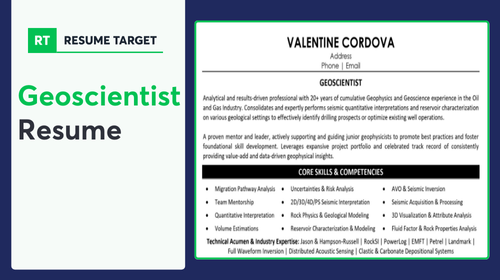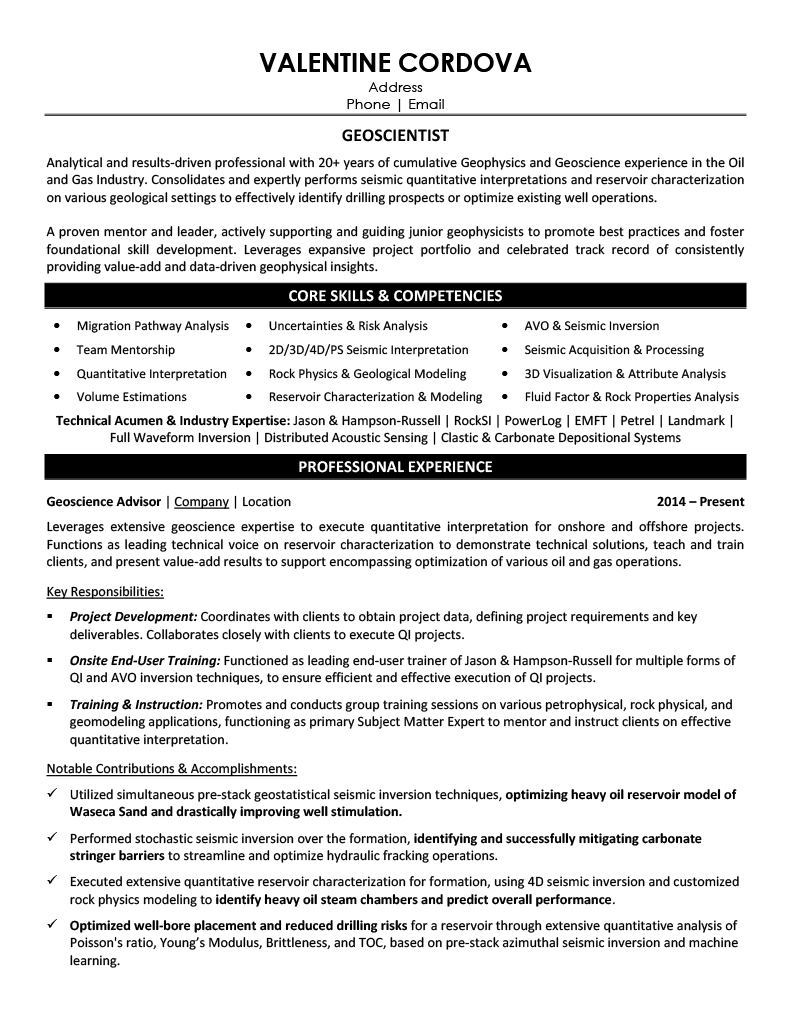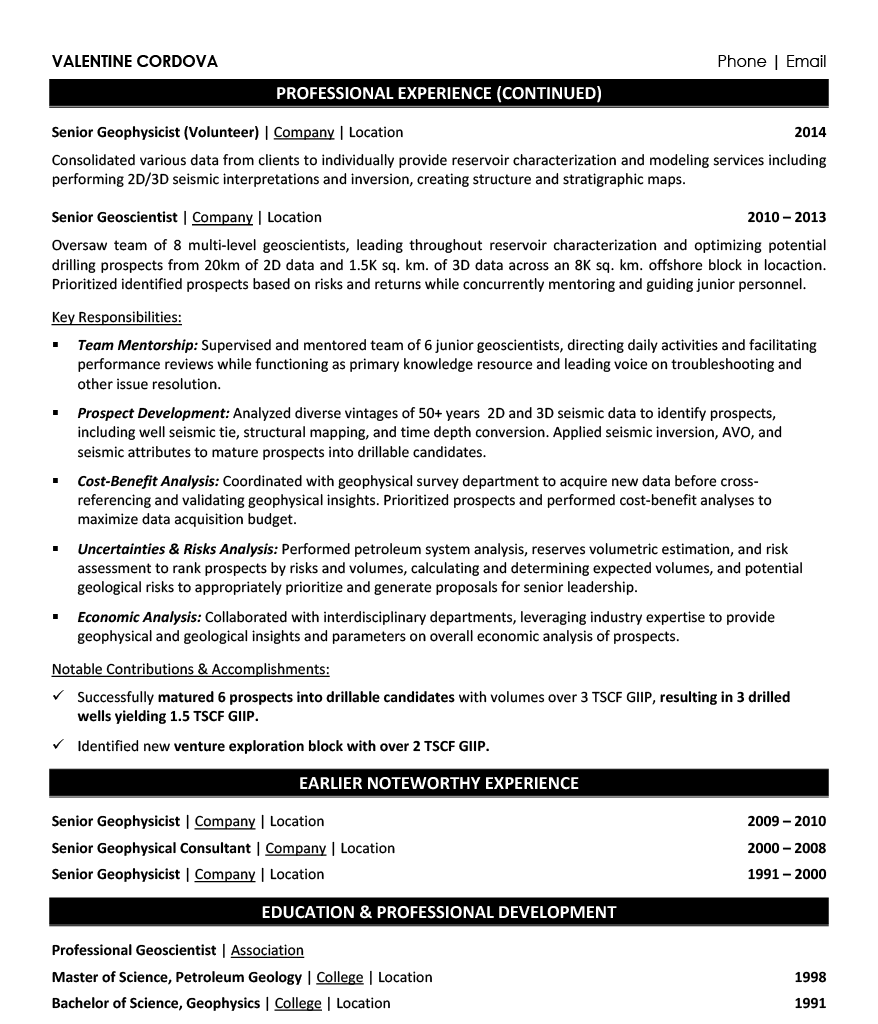

Mapping complex geological data onto a single resume page feels like squeezing an ocean into a teacup. Your extensive fieldwork, research, and technical expertise deserve more than a basic skills list.
Are you struggling to translate your scientific achievements into language that both technical and non-technical hiring managers understand? A well-crafted geoscientist resume bridges the gap between complex geological concepts and clear business value.
Resume Target specializes in helping geoscientists showcase their unique combination of scientific expertise and practical field experience. This guide will show you exactly how to transform your technical background into a compelling story that lands interviews.


As Earth's scientific detectives, geoscientists unlock the planet's mysteries by studying everything from ancient rock formations to modern-day seismic activity, with many specializing in critical areas like environmental geology, paleontology, and petroleum geology.
Whether they're collecting rock samples in remote locations, analyzing core samples in high-tech laboratories, or creating detailed geological maps, these earth science professionals combine fieldwork with sophisticated analysis to understand our planet's past and predict its future changes.
If you're fascinated by Earth's processes and want to contribute to our understanding of climate change, natural resource management, or natural disaster prediction, a career in geoscience offers diverse opportunities to make meaningful discoveries while advancing through roles of increasing responsibility and scientific impact.
Let's talk about what's exciting in the world of geoscience careers! Your earning potential as a geoscientist can be truly impressive, with compensation ranging from entry-level positions all the way up to executive roles. And guess what? Your specialized skills in studying Earth's composition, structure, and processes can lead to increasingly rewarding opportunities as you advance in your career.
Figures from: U.S. Bureau of Labor Statistics
Start your geoscience career with field studies and lab work, then advance to managing major earth science projects. With experience and advanced degrees, you can progress from hands-on work to leading research teams.
Beyond basic geological knowledge, advancing in this field requires a strategic mix of technical expertise and leadership capabilities.
- Advanced geological mapping and modeling - Environmental sampling and site assessment - Data analysis and interpretation - Project management and team leadershipBreaking into geoscience starts with combining field experience and technical expertise, with entry-level positions typically requiring a bachelor's degree in geology, environmental science, or related fields.
To build a successful career path, you'll need to develop key competencies, with written communication skills being the most sought-after qualification at 67% of job postings.
Requirements from Grow Geocareers
From oil-rich Texas to tech-forward California, geoscientist opportunities span diverse industries and growing regions.
Figures from U.S. Bureau of Labor Statistics
Struggling to translate your complex field experience, research projects, and technical expertise into a compelling geoscientist resume that catches a hiring manager's eye? This comprehensive, section-by-section guide will show you exactly how to showcase your geological expertise, field work, and analytical skills in a format that resonates with employers.
As a geoscientist, you excel at analyzing complex geological data and conducting detailed field research, yet condensing your professional story into a few powerful lines can feel more challenging than interpreting stratigraphic sequences.
While you may be an expert at mapping subsurface structures and evaluating geological hazards, translating these specialized skills into compelling resume language that resonates with hiring managers requires a strategic approach that highlights both your technical expertise and real-world impact.
How would you describe your unique blend of geological expertise and analytical methodologies that set you apart in the field of earth sciences?
Reason: This helps frame your professional identity and immediately signals to employers your core competencies within geoscience. It encourages you to think about your distinctive approach to geological work that makes you valuable.
What are the primary areas of geoscience (such as mineralogy, hydrogeology, or environmental assessment) where you've developed the deepest expertise throughout your career?
Reason: This question helps you articulate your specialized focus areas within the broad field of geoscience, allowing employers to quickly understand your professional niche and potential value to their specific projects.
How have you combined field experience with technological tools and data analysis to advance geological understanding in your work?
Reason: This prompts you to highlight your ability to bridge traditional geological methods with modern technological approaches, showcasing your adaptability and comprehensive skill set in modern geoscience practice.
As a geoscientist, you'll need to showcase both your technical expertise in geological analysis and modeling software alongside your field research capabilities and analytical thinking skills.
From mastering complex tools like ArcGIS and Petrel to demonstrating your experience with core sampling and seismic interpretation, your skills section should reflect the full spectrum of your geological expertise while highlighting your ability to translate scientific findings into actionable insights.
Showcase your geological expertise by organizing your experience into three powerful sections: a concise role overview that sets the stage, quantifiable achievements that highlight your impact in field studies and analysis, and core responsibilities that demonstrate your technical and research capabilities.
Many geoscientists struggle to translate complex technical fieldwork and analytical findings into clear, business-focused accomplishments that resonate with hiring managers. Transform your geological expertise into powerful success stories by connecting your research, analysis, and discoveries to tangible business outcomes like resource identification, risk mitigation, and exploration cost savings.
A strong responsibilities section demonstrates how Geoscientists analyze Earth's composition, structure, and processes beyond basic data collection. Your duties should clearly show how your geological expertise connects to resource exploration, environmental protection, and project success while remaining accessible to non-technical hiring managers.
Your academic background and professional certifications are crucial assets in the geosciences field. Start with your highest degree in geology, earth sciences, or related fields, then highlight your professional registrations and specialized certifications that demonstrate your expertise in areas like hydrogeology, mineral exploration, or environmental assessment.
Now that you've built a strong foundation following Resume Target's comprehensive resume writing guidelines, you're ready to transform your resume into a powerful tool for landing your ideal geoscientist position.
While many candidates focus solely on customizing their cover letters, successful geoscientists know that personalizing their resume for each position is equally crucial in today's competitive job market.
A carefully tailored resume not only helps you navigate through ATS systems by incorporating role-specific keywords, but it also demonstrates to hiring managers that your geological expertise and research experience perfectly align with their specific project needs and team requirements.
Ready to stand out from the crowd? Let's transform your resume into a laser-focused presentation that proves you're the exact geoscientist they've been searching for!
Don't let a lack of professional experience hold you back from launching your career as a Geoscientist!
Your academic background, research projects, and field work experience can create a compelling story that employers want to read.
Focus on highlighting your geological knowledge, research capabilities, and technical skills when crafting your resume.
For detailed guidance on formatting and content, check out the Student Resume Writing Guide to ensure your application stands out.
Your geoscience education and research projects are valuable assets that deserve spotlight placement in your summary section.
Transform your academic achievements, field experience, and technical skills into a compelling narrative that shows employers you're ready to make an immediate impact.
"Detail-oriented and research-driven Geoscientist with comprehensive academic training and 2+ years of field research experience in geological mapping and mineral exploration. Proficient in GIS software, geophysical data analysis, and core sampling techniques, with demonstrated success in undergraduate research projects. Completed summer internship with state geological survey, contributing to groundwater assessment studies. Seeking to leverage strong analytical skills and passion for earth sciences to contribute to environmental and resource exploration projects."
Now's your chance to showcase the rigorous academic foundation that prepared you for an impactful career in geoscience - make every detail count!
Transform your coursework and research projects into compelling proof of your expertise by highlighting specialized areas like mineralogy, structural geology, or geophysical mapping, along with any field studies or lab research that demonstrates your hands-on capabilities.
1. Common courses for a Geoscientist degree/certification include Earth Sciences, Geology, Physics, Chemistry, Biology, Mathematics, Computer Science [1], soil and rock mechanics [1], surveying, technical writing, GIS (Geographic Information Systems), public speaking, business and/or economics [1], geostatistics, mathematics, numerical modeling, computer [2], and geophysics [4].Relevant Coursework: Earth Sciences | Geology | Geophysics | GIS Systems | Geostatistics | Numerical Modeling
Key Projects:
Geological Mapping and Analysis Project: Led comprehensive geological survey of local fault systems using advanced mapping techniques and geophysical tools to assess structural stability and mineral potential.
Subsurface Resource Assessment Study: Collaborated with a four-person team to evaluate potential groundwater resources in a semi-arid region using multiple geophysical methods.
Leverage your academic background, research experience, and technical training by showcasing the specialized skills you've developed through your geology coursework, laboratory work, and field studies to create a compelling skills section that catches employers' attention.
As an entry-level Geoscientist, your combination of technical expertise and analytical capabilities positions you well for a growing field where environmental concerns and resource exploration are creating exciting opportunities for new professionals.
When you're deep in the world of geological mapping, core sampling, and resource estimation, it can feel impossible to translate your complex field experience into language that resonates with hiring managers.
At Resume Target, we specialize in crafting resumes for geoscientists that bridge the gap between technical expertise and business impact, having helped countless professionals showcase their contributions to major exploration projects and resource discoveries.
With exploration budgets increasing and new projects launching across the industry, now is the perfect time to transform your technical expertise into a compelling career story - let's connect today to craft your standout resume.
Impress any hiring manager with our Geology resume writing service. We work with all career levels and types of Geology professionals.
Learn More → Geology Resume Writing Services